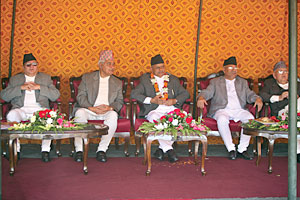 KIRAN PANDAY |
Not just those hoping for a cabinet berth, even top bureaucrats were attired in the daura suruwal for the Republic Day reception at the presidential palace last week. The absence of GPK and PKD was more than made up by the be-medalled presence of men in uniform from the security forces.
Looking somewhat lost in the crowd of political pragmatists and social climbers in the gardens of Shital Nibas, NC leader Taranath Ranabhat appeared to be rueing the day he decided to support the pro-monarchy lobby of the NC. But anti-Maoist realignment of political forces in the country seems to have vindicated the position of those who believed that dominance of the military was preferable to the rule of militants.
Messrs Khadka, Joshi and Gachhedar, the notorious kangresi KGB trio were known for their vehement anti-UML stand in the mid-1990s. They have been the main actors this time in propping up Prime Minister Nepal. Naturally, they are grinning from ear to ear these days because those who make often reserve the right to unmake. Perhaps that should give some hope to Ranabhat, too. If Nepal can appear out of nowhere to head a 22-party coalition, who knows what is in store for the Speaker who investigated Narayanhiti Massacre? Interestingly, Nepal had first agreed to be in the investigation committee in June 2001 and then chickened out.
The UML's past will come back to haunt Comrade Nepal and his fellow travellers in the government. After the formation of first post-Panchayat government on 29 May 1991, the main opposition party refused to give customary 100-day honeymoon period to the Koirala cabinet. The UML unleashed its civil servants' unions within two months of a majority government being formed. The strike began unreasonably and ended abruptly.
Unity Centre, the Maoist parent organisation, had supported the agitation of civil servants affiliated with UML. The radicals began to doubt the intentions of the comrades when the strike was called off without any explanation.
Throughout the 1990s, the UML set new records in enforcing bandas and disrupting parliament. After the death of Madan Bhandari and Jib Raj Ashrit in a highway accident, UML cadres went on the rampage alleging that Prime Minister Koirala was somehow responsible for the car skidding off the slippery road and into the Narayani.
In 2001, the UML disrupted the entire 19th session of parliament, which had to then end without discussing any bills. A visibly upset Speaker Ranabhat had then said: "Though history will analyse it, this session, in my reading, is the most fruitless one after the restoration of multiparty democracy in 1990." History has already passed its judgement: the UML was instrumental in the demise of the constitution that it helped draft in 1990 to institutionalise people's sovereignty and constitutional monarchy.
The problem with Nepal's 'moderate' Marxist-Leninist apparatchiks is that they don't know whether they want to be a revolutionary or parliamentary force. Worse, they don't know that they don't know. Hence, the constant flip-flopping and political promiscuity.
The Maoists are wasting their time and energy in boycotting the constituent assembly meetings-it's useless, if not counter-productive. The UML couldn't care less if it sits or not. If anyone were looking for excuses to suspend the interim constitution, the Maoist lawmakers appear to be giving them a very powerful reason to discard it in the dustbin of history.



